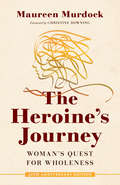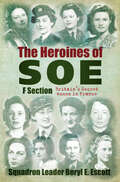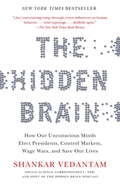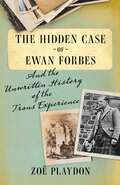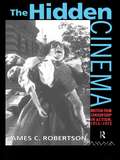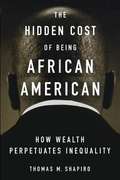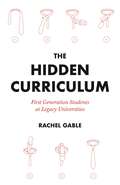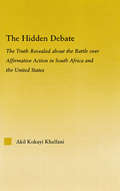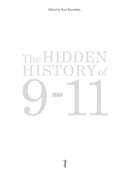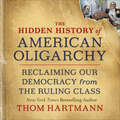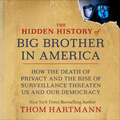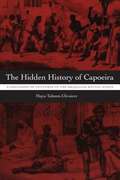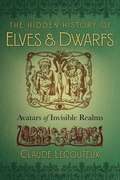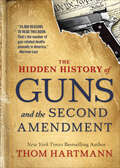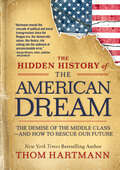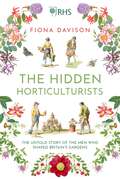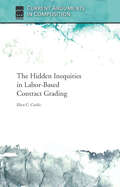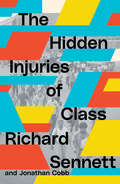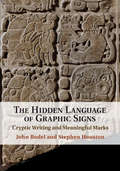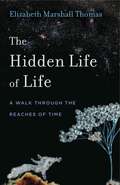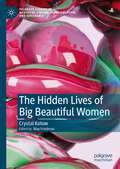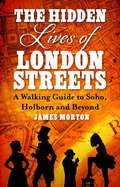- Table View
- List View
The Heroine's Journey: Woman's Quest for Wholeness
by Maureen MurdockThis book describes contemporary woman's search for wholeness in a society in which she has been defined according to masculine values. Drawing upon cultural myths and fairy tales, ancient symbols and goddesses, and the dreams of contemporary women, Murdock illustrates the need for—and the reality of—feminine values in Western culture today.
The Heroines of SOE: Britain's Secret Women in France: F Section
by Beryl E EscottBritain’s war in the shadows of male spies and subterfuge in the heart of occupied France is a story well known, but what of the women who also risked their lives for Britain and the liberation of France? In 1942 a desperate need for new recruits, saw SOE turn to a previously overlooked group – women. These extraordinary women came from different backgrounds, but were joined in their idealistic love of France and a desire to play a part in its liberation. They formed SOE’s F Section. From the famous White Mouse, Nancy Wake, to the courageous, Noor Inayat Khan, they all risked their lives for King, Country and the Resistance. Many of them died bravely and painfully, and often those who survived, like Eileen Nearne, never told their stories, yet their secret missions of intelligence-gathering and sabotage undoubtedly helped the Resistance to drive out their occupiers and free France. Here, for the first time is the extraordinary account of all forty SOE F women agents. It is a story that deserves to be read by everyone. ‘They were the war’s bravest women, devoted to defeating the Nazis yet reluctant ever to reveal their heroic pasts. Now a new book tells their intrepid tales.’ Daily Express Squadron Leader BERYL E. ESCOTT served in the RAF and is one of the foremost experts on the women of SOE.
The Hidden Brain: How Our Unconscious Minds Elect Presidents, Control Markets, Wage Wars, and Save Our Lives
by Shankar VedantamMost of us would agree that there is a clear--and even obvious--connection between the things we believe and the way we behave. But what if our actions are driven not by our conscious values and beliefs but by hidden motivations we're not even aware of? The Hidden Brain is Shankar Vedantam's shorthand for a host of brain functions, emotional responses, and cognitive processes that happen outside our conscious awareness but have a decisive effect on how we behave. The hidden brain has its finger on the scale when we make all our most complex and important decisions: It decides whom we fall in love with, whether we should convict someone of murder, and which way to run when someone yells "Fire!" It explains why we can become riveted by the story of a single puppy adrift on the ocean but are quickly bored by a story of genocide. The hidden brain can also be deliberately manipulated to convince people to vote against their own interests, or even become suicide terrorists. But the most disturbing thing is that it does all this without our knowing. Shankar Vedantam, author of The Washington Post's Department of Human Behavior column, takes us on a tour of this phenomenon and explores its consequences. Using original reporting that combines the latest scientific research with compulsively readable narratives that take readers from the American campaign trail to terrorist indoctrination camps, from the World Trade Center on 9/11 to, yes, a puppy adrift on the Pacific Ocean, Vedantam illuminates the dark recesses of our minds while making an original argument about how we can compensate for our blind spots and what happens when we don't.
The Hidden Case of Ewan Forbes: And the Unwritten History of the Trans Experience
by Zoë PlaydonThe life story of an aristocratic Scottish trans man—whose secret 1968 legal case had a profound impact on trans rights for decades.Ewan Forbes was born to a wealthy, landowning family, holders of a baronetcy, in Aberdeenshire, Scotland, in 1912. Assigned female at birth, his true identity was nevertheless clear even in childhood—and so, with the support of his mother, he was taken to European specialists and eventually treated with early preparations of synthetic testosterone. Raised as a boy at home but socially obliged to present himself as a girl in public until his official coming out to the Queen, Ewan grew up, became a doctor, and got married. (This required him to change the sex on his birth certificate, which was possible at that time without much fuss.) For decades, he lived a quiet life as a husband, doctor, and a pillar of the local community. But in 1965, Ewan&’s older brother died unexpectedly—meaning that Ewan was set to inherit the baronetcy. His title could only be inherited by the next oldest man in the family and when his cousin John—spurred on by Ewan&’s sister—contested the inheritance he was forced to defend his male status in Scotland&’s supreme civil court, where he prevailed. This hugely important case would have changed the lives of trans people across the world—if it hadn&’t been hidden. The hearing was conducted privately, the media were gagged, and those involved were sworn to secrecy. The case remained unknown until 1996 and now finally is described here, along with the life of Ewan Forbes, for the first time. Enlightening and galvanizing, The Hidden Case of Ewan Forbes is a singular contribution to trans history and the ongoing struggle for trans rights.
The Hidden Cinema: British Film Censorship in Action 1913-1972 (Cinema and Society)
by James Robertson Dr James RobertsonHow does film censorship work in Britain? Jim Robertson's new paperback edition of The Hidden Cinema argues that censorship has had a far greater influence on British film history than is often apparent, creating the `hidden cinema' of the title. Robertson charts the role of the British Board of Film Censors, established in 1913, and the histories of a variety of noteworthy films including Battleship Potemkin and No Orchids for Miss Blandish and revealing how censorship continues to exert a marked influence on many important films - like the controversial A Clockwork Orange - some of which have now vanished from British screens altogether. This edition includes a brand new section on Bernardo Bertolucci's Last Tango in Paris, immediately engulfed in censorship wrangles on its release in 1972.
The Hidden Cost of Being African American: How Wealth Perpetuates Inequality
by Thomas M. ShapiroOver the past three decades, racial prejudice in America has declined significantly and many African American families have seen a steady rise in employment and annual income. But alongside these encouraging signs, Thomas Shapiro argues in The Hidden Cost of Being African American, fundamental levels of racial inequality persist, particularly in the area of asset accumulation--inheritance, savings accounts, stocks, bonds, home equity, and other investments. Shapiro reveals how the lack of these family assets along with continuing racial discrimination in crucial areas like home ownership dramatically impact the everyday lives of many black families, reversing gains earned in schools and on jobs, and perpetuating the cycle of poverty in which far too many find themselves trapped. Shapiro uses a combination of in-depth interviews with almost 200 families from Los Angeles, Boston, and St. Louis, and national survey data with 10,000 families to show how racial inequality is transmitted across generations. We see how those families with private wealth are able to move up from generation to generation, relocating to safer communities with better schools and passing along the accompanying advantages to their children. At the same time those without significant wealth remain trapped in communities that don't allow them to move up, no matter how hard they work. Shapiro challenges white middle class families to consider how the privileges that wealth brings not only improve their own chances but also hold back people who don't have them. This "wealthfare" is a legacy of inequality that, if unchanged, will project social injustice far into the future. Showing that over half of black families fall below the asset poverty line at the beginning of the new century, The Hidden Cost of Being African American will challenge all Americans to reconsider what must be done to end racial inequality.
The Hidden Curriculum: First Generation Students at Legacy Universities
by Rachel GableA revealing look at the experiences of first generation students on elite campuses and the hidden curriculum they must master in order to succeedCollege has long been viewed as an opportunity for advancement and mobility for talented students regardless of background. Yet for first generation students, elite universities can often seem like bastions of privilege, with unspoken academic norms and social rules. The Hidden Curriculum draws on more than one hundred in-depth interviews with students at Harvard and Georgetown to offer vital lessons about the challenges of being the first in the family to go to college, while also providing invaluable insights into the hurdles that all undergraduates face.As Rachel Gable follows two cohorts of first generation students and their continuing generation peers, she discovers surprising similarities as well as striking differences in their college experiences. She reveals how the hidden curriculum at legacy universities often catches first generation students off guard, and poignantly describes the disorienting encounters on campus that confound them and threaten to derail their success. Gable shows how first-gens are as varied as any other demographic group, and urges universities to make the most of the diverse perspectives and insights these talented students have to offer.The Hidden Curriculum gives essential guidance on the critical questions that university leaders need to consider as they strive to support first generation students on campus, and demonstrates how universities can balance historical legacies and elite status with practices and policies that are equitable and inclusive for all students.
The Hidden Debate: The Truth Revealed about the Battle over Affirmative Action in South Africa and the United States (African Studies)
by Akil Kokayi KhalfaniThe Hidden Debate is a fresh and cutting-edge comparative analysis of the ongoing and highly charged social conflict over affirmative action in South Africa and the United States. The debate over affirmative action has raged for over 30 years in the United States and since the early 1990s in South Africa with minimal agreement or resolution. In part this discord remains because scholars, journalists, politicians, and other social analysts have failed to properly specify and examine the problem.
The Hidden History of 9/11 (Research In Political Economy Ser.)
by Paul ZarembkaHow much insider trading occurred in the days leading up to 9-11? How compromised is the evidence against alleged hijackers? Why were there no military interceptions? To what extent does the testimony of more than five hundred firefighters differ from official reports of what happened at the World Trade Center buildings that day? How inseparably connected are Western covert operations to al-Qaeda? How is Islamophobia used to sustain US imperialism? What was the 9-11 Commission?With contributions from Nafeez Mosaddeq Ahmed, Four Arrows, David Ray Griffin, Jay Kolar, David MacGregor, Diana Ralph, Kevin Ryan, and Bryan Sacks, this path-breaking work examines 9-11 and its background, showing how much remains unknown and where further investigation and debate is needed.
The Hidden History of American Oligarchy: Reclaiming Our Democracy from the Ruling Class (The\thom Hartmann Hidden History Ser. #5)
by Thom HartmannThe New York Times–bestselling author looks at the real history of the corrupting influence of oligarchy in America—and how we can fight back. Billionaire oligarchs want to own our republic, and they&’re nearly there thanks to legislation and Supreme Court decisions that they have essentially bought. They put Trump and his political allies into office and support a vast network of think tanks, publications, and social media that every day push our nation closer and closer to police-state tyranny. The United States was born in a struggle against the oligarchs of the British aristocracy, and ever since then the history of America has been one of dynamic tension between democracy and oligarchy. And much like the shock of the 1929 crash woke America up to glaring inequality and the ongoing theft of democracy by that generation's oligarchs, the coronavirus pandemic of 2020 has laid bare how extensively oligarchs have looted our nation&’s economic system, gutted governmental institutions, and stolen the wealth of the former middle class. Thom Hartmann, , the most popular progressive radio host in America and a bestselling author, traces the history of this struggle against oligarchy from America&’s founding to the United States&’ war with the feudal Confederacy to President Franklin Roosevelt&’s struggle against &“economic royalists,&” who wanted to block the New Deal. In each of those cases, the oligarchs lost the battle. But with increasing right-wing control of the media, unlimited campaign contributions, and a conservative takeover of the judicial system, we're at a crisis point. Now is the time for action, before we flip into tyranny. We&’ve beaten the oligarchs before, and we can do it again. Hartmann lays out practical measures we can take to break up media monopolies, limit the influence of money in politics, reclaim the wealth stolen over decades by the oligarchy, and build a movement that will return control of America to We the People. Praise forThe Hidden History of American Oligarchy &“For every American interested in protecting our democracy, everyone puzzled about how America came to the brink of authoritarian rule, and for all who enjoy a being educated and entertained by enthralling, eye-opening, riveting journey in U.S. history, The Hidden History of Oligarchy is a must read!&” —Don Siegelman, former Governor of Alabama, author of Stealing Our Democracy &“Thom Hartmann is America&’s history teacher, a national treasure laying it out scary and clear: tyranny can happen here. Oligarchy&’s choking democracy.&” —Mimi Kennedy, actress, board member, Progressive Democrats of America
The Hidden History of Big Brother in America: How the Death of Privacy and the Rise of Surveillance Threaten Us and Our Democracy (The\thom Hartmann Hidden History Ser. #7)
by Thom HartmannThe radio host and New York Times–bestselling author reveals how government and corporations misuse our personal data and how we can reclaim our privacy. Many Americans worry about how companies like Facebook invade their privacy and harvest their data, but few fully understand the details of how their information is used—and misused. In this thought-provoking book, Thom Hartmann reveals exactly how the government and corporations are tracking our every online move and using our data for purposes ranging from buying elections to monetizing our lives. Hartmann uses extensive, vivid examples to highlight the consequences of Big Data on all aspects of our lives, and traces the history of surveillance. As he explains, the goal of those who violate privacy and use surveillance is almost always social control and behavior modification. Along with covering the history, Hartmann shows how we got to where we are today, how China—with its new Social Credit System—serves as a warning, and how we can and must avoid a similarly dystopian future. By delving into the Constitutional right to privacy, Hartmann reminds us of our civil right and shows how we can restore it. &“Expertly chronicles how Big Data coercively shapes our lives to profit off us . . . Hartmann&’s urgent warning about the rise of the corporate-police state couldn&’t be timelier.&” —Maya Schenwar, coauthor of Prison by Any Other Name Praise for Thom Hartmann &“Solid research.&” —Publishers Weekly &“Brilliant ideas and eloquent writing.&”—John Perkins, author of Confessions of an Economic Hit Man
The Hidden History of Capoeira
by Maya Talmon-ChvaicerCapoeira, a Brazilian battle dance and national sport, has become popular all over the world. First brought to Brazil by African slaves and first documented in the late eighteenth century, capoeira has undergone many transformations as it has diffused throughout Brazilian society and beyond, taking on a multiplicity of meanings for those who participate in it and for the societies in which it is practiced. In this book, Maya Talmon-Chvaicer combines cultural history with anthropological research to offer an in-depth study of the development and meaning of capoeira, starting with the African cultures in which it originated and continuing up to the present day. Using a wealth of primary sources, Talmon-Chvaicer analyzes the outlooks on life, symbols, and rituals of the three major cultures that inspired capoeira - the Congolese (the historic area known today as Congo-Angola), the Yoruban, and the Catholic Portuguese cultures. As she traces the evolution of capoeira through successive historical eras, Talmon-Chvaicer maintains a dual perspective, depicting capoeira as it was experienced, observed, and understood by both Europeans and Africans, as well as by their descendants. This dual perspective uncovers many covert aspects of capoeira that have been repressed by the dominant Brazilian culture. This rich study reclaims the African origins and meanings of capoeira, while also acknowledging the many ways in which Catholic-Christian culture has contributed to it. The book will be fascinating reading not only for scholars but also for capoeira participants who may not know the deeper spiritual meanings of the customs, amulets, and rituals of this jogo da vida, "game of life. "
The Hidden History of Elves and Dwarfs: Avatars of Invisible Realms
by Claude Lecouteux Régis BoyerA comprehensive examination of the intertwined mythology, folklore, and literary history of the little people • Explores the pagan roots of dwarfs and elves and their evolution in myth and literature • Reveals the role the church played in changing them from fearless, shape-shifting warriors with magical powers into cheerful helpmates and cute garden gnomes • Traces their history from ancient Celtic and Germanic lore through their emergence in the literature of the Middle Ages to their modern popularization by the Brothers Grimm and Walt Disney Most people are familiar with the popular image of elves as Santa’s helpers and dwarfs as little bearded men wearing red caps, who are mischievous and playful, helpful and sly, industrious and dexterous. But their roots go far deeper than their appearance in fairy tales and popular stories. Elves and dwarfs are survivors of a much older belief system that predates Christianity and was widespread throughout Western Europe. Sharing his extensive analysis of Germanic and Norse legends, as well as Roman, Celtic, and medieval literature, Claude Lecouteux explores the ancient, intertwined history of dwarfs and elves. He reveals how both were once peoples who lived in wild regions as keepers of the secrets of nature. They were able to change their size at will and had superhuman strength and healing powers. They were excellent smiths, crafting swords that nothing could dull as well as magical jewelry, and often entered into the service of lords or heroes. They were a part of the everyday life of our ancestors before they were transformed by fairy tales and church texts into the mythical creatures we know today. Lecouteux shows how, in earlier folklore, elves and dwarfs were interchangeable, gradually evolving over time to express very different kinds of beings. “Dwarf,” “giant,” and even “elf” did not necessarily connote size but referred to races with different skills. Elves were more ethereal, offering protection and kindness, while dwarfs reflected a more corporeal form of spirit, often appearing as messengers from the underworld. Yet dwarfs and elves could be bargained with, and our ancestors would leave a broken object outside the door at night with the hope that a dwarf or elf (or other local spirit) would repair it. Revealing the true roots of these helpful and powerful beings, including an in-depth exploration of one of the most famous dwarf/elf/fairy beings of the Middle Ages, Auberon or Oberon, also known as Alberich, Lecouteux shows how the magic of dwarfs and elves can be rekindled if we recognize their signs and invite them back into our world.
The Hidden History of Guns and the Second Amendment: How to Talk about Race, Religion, Politics, and Other Polarizing Topics (The\thom Hartmann Hidden History Ser. #1)
by Thom HartmannThe New York Times–bestselling author explores the real history of guns in America and how to limit both their lethal impact and the gun lobby&’s power. Taking his typically in-depth, historically informed view, Thom Hartmann, the most popular progressive radio host in America, examines the brutal role guns have played in American history, from the genocide of the Native Americans to the enforcement of slavery (Slave Patrols are in fact the Second Amendment&’s &“well-regulated militias&”) and the racist post–Civil War social order. He shows how the NRA and conservative Supreme Court justices used specious logic to invent a virtually unlimited individual right to own guns, which has enabled the ever-growing number of mass shootings in the United States. But Hartmann also identifies a handful of powerful, commonsense solutions that would break the power of the gun lobby and restore the understanding of the Second Amendment that the Framers of the Constitution intended. This is the kind of brief, brilliant analysis for which Hartmann is justly renowned. Praise for The Hidden History of Guns and the Second Amendment&“In this precise primer on firearms practices and policies, progressive talk-show host Hartmann examines the history of routine gun usage and extreme gun violence and assesses the influence of gun ownership on contemporary political, economic, and social norms…. A brief but powerful analysis of a searing national crisis.&” —Booklist&“34,000 REASONS TO READ THIS BOOK: That&’s the number of gun-related deaths annually in America.&” —Norman Lear&“When Thom Hartmann talks, I listen. What Thom Hartmann writes, I read. This book about the history of guns in America—and most importantly, what should be the future of guns in America—is important, mind-opening, and profoundly helpful.&” —Marianne Williamson
The Hidden History of South Africa's Book and Reading Cultures
by Archie L. DickThe Hidden History of South Africa's Book and Reading Cultures shows how the common practice of reading can illuminate the social and political history of a culture. This ground-breaking study reveals resistance strategies in the reading and writing practices of South Africans; strategies that have been hidden until now for political reasons relating to the country's liberation struggles. By looking to records from a slave lodge, women's associations, army education units, universities, courts, libraries, prison departments, and political groups, Archie Dick exposes the key works of fiction and non-fiction, magazines, and newspapers that were read and discussed by political activists and prisoners.Uncovering the book and library schemes that elites used to regulate reading, Dick exposes incidences of intellectual fraud, book theft, censorship, and book burning. Through this innovative methodology, Dick aptly shows how South African readers used reading and books to resist unjust regimes and build community across South Africa's class and racial barriers.
The Hidden History of the American Dream: The Demise of the Middle Classand How to Rescue Our Future (The Thom Hartmann Hidden History Series #4)
by Thom HartmannAmerica's most popular progressive radio host and New York Times bestselling author explores the fall of the American Dream and the steps we can take to bring it back.The widening wealth gap is all too familiar to many Millennials and GenZers, especially when home ownership and the lack of debt seem like faraway fantasies. And it's no surprise when they only hold about 4.6% of the country's wealth while Boomers held 22% at around the same age. So what happened to the promise of the American Dream?In this new, final entry of his celebrated Hidden History Series, Thom Hartmann uncovers the rise of the American middle class through the progressive policies of FDR, through to its downfall with the increasing privatization and economic deregulations of the Reagan era.He also explores potential solutions including:Wealth and inheritance taxes to lessen economic inequalitySupporting unions through increasing labor rightsRenationalizing public spaces and transportationThe American Dream often remains just a dream for many, but this book highlights what needs to be done to take it back and help make it a reality for us all.
The Hidden Horticulturists: The Untold Story of the Men Who Shaped Britain's Gardens
by Fiona DavisonIn 2012, while working at the Royal Horticultural Society's library, Fiona Davison unearthed a book of handwritten notes that dated back to 1822. The notes, each carefully set out in neat copperplate writing, had been written by young gardeners in support of their application to be received into the Society's Garden. Among them was an entry from the young Joseph Paxton, who would go on to become one of Britain's best-known gardeners and architects. But he was far from alone, and now, for the first time, the stories of the young, working-class men who also played a central role in the history of British horticulture can be told. Using their notes, Fiona Davison traces the stories of a selection of these forgotten gardeners whose lives would take divergent paths to create a unique history of gardening. The trail took her from Chiswick to Bolivia and uncovered tales of fraud, scandal and madness—and, of course, a large number of fabulous plants and gardens. This is a celebration of the unsung heroes of horticulture whose achievements reflect a golden moment in British gardening, and continue to influence gardeners today..
The Hidden Inequities in Labor-Based Contract Grading (Current Arguments in Composition)
by Ellen C. CarilloCurrent Arguments in Composition Series The Hidden Inequities in Labor-Based Contract Grading intervenes in the increasingly popular practice of labor-based grading by expanding the scope of this assessment practice to include students who are disabled and multiply marginalized. Through the lens of disability studies, the book critiques the assumption that labor is a neutral measure by which to assess students and explores how labor-based grading contracts put certain groups of students at a disadvantage. Ellen C. Carillo offers engagement-based grading contracts as an alternative that would provide a more equitable assessment model for students of color, those with disabilities, and students who are multiply marginalized. This short book explores the history of labor-based grading contracts, reviews the scholarship on this assessment tool, highlights the ways in which it normalizes labor as an unbiased tool, and demonstrates how to extend the conversation in new and generative ways both in research and in classrooms. Carillo encourages instructors to reflect on their assessment practices by demonstrating how even assessment methods that are designed through a social-justice lens may unintentionally privilege some students over others.
The Hidden Injuries of Class
by Richard Sennett Jonathan CobbHow to find dignity and a meaningful life in the modern cityIn this reissue of the 1972 classic of social anatomy, Richard Sennets adds a new introduction to shows how the injuries of class persist into the 21st century. In this intrepid, groundbreaking book, Richard Sennett and Jonathan Cobb uncover and define a new form of class conflict in America an internal conflict in the heart and mind of the blue-collar worker who measures his own value against those lives and occupations to which our society gives a special premium. The authors conclude that in the games of hierarchical respect, no class can emerge the victor; and that true egalitarianism can be achieved only by rediscovering diverse concepts of human dignity. Examining personal feelings in terms of a totality of human relations, and looking beyond the struggle for economic survival, The Hidden Injuries of Class takes an important step forward in the sociological critique of everyday life.
The Hidden Language of Graphic Signs: Cryptic Writing and Meaningful Marks
by John Bodel Stephen HoustonA common belief is that systems of writing are committed to transparency and precise records of sound. The target is the language behind such marks. Readers, not viewers, matter most, and the most effective graphs largely record sound, not meaning. But what if embellishments mattered deeply - if hidden writing, slow to produce, slow to read, played as enduring a role as more accessible graphs? What if meaningful marks did service alongside records of spoken language? This book, a compilation of essays by global authorities on these subjects, zeroes in on hidden writing and alternative systems of graphic notation. Essays by leading scholars explore forms of writing that, by their formal intricacy, deflect attention from language. The volume also examines graphs that target meaning directly, without passing through the filter of words and the medium of sound. The many examples here testify to human ingenuity and future possibilities for exploring enriched graphic communication.
The Hidden Life of Life: A Walk through the Reaches of Time (Animalibus)
by Elizabeth Marshall ThomasAn iconoclast and best-selling author of both nonfiction and fiction, Elizabeth Marshall Thomas has spent a lifetime observing, thinking, and writing about the cultures of animals such as lions, wolves, dogs, deer, and humans. In this compulsively readable book, she provides a plainspoken, big-picture look at the commonality of life on our planet, from the littlest microbes to the largest lizards.Inspired by the idea of symbiosis in evolution—that all living things evolve in a series of cooperative relationships—Thomas takes readers on a journey through the progression of life. Along the way she shares the universal likenesses, experiences, and environments of “Gaia’s creatures,” from amoebas in plant soil to the pets we love, from proud primates to Homo sapiens hunter-gatherers on the African savanna. Fervently rejecting “anthropodenial,” the notion that nonhuman life does not share characteristics with humans, Thomas instead shows that paramecia can learn, plants can communicate, humans aren’t really as special as we think we are—and that it doesn’t take a scientist to marvel at the smallest inhabitants of the natural world and their connections to all living things.A unique voice on anthropology and animal behavior, Thomas challenges scientific convention and the jargon that prevents us all from understanding all living things better. This joyfully written book is a fascinating look at the challenges and behaviors shared by creatures from bacteria to larvae to parasitic fungi, a potted hyacinth to the author herself, and all those in between.
The Hidden Life of Life: A Walk through the Reaches of Time (Animalibus: Of Animals and Cultures #13)
by Elizabeth Marshall ThomasAn iconoclast and best-selling author of both nonfiction and fiction, Elizabeth Marshall Thomas has spent a lifetime observing, thinking, and writing about the cultures of animals such as lions, wolves, dogs, deer, and humans. In this compulsively readable book, she provides a plainspoken, big-picture look at the commonality of life on our planet, from the littlest microbes to the largest lizards.Inspired by the idea of symbiosis in evolution—that all living things evolve in a series of cooperative relationships—Thomas takes readers on a journey through the progression of life. Along the way she shares the universal likenesses, experiences, and environments of “Gaia’s creatures,” from amoebas in plant soil to the pets we love, from proud primates to Homo sapiens hunter-gatherers on the African savanna. Fervently rejecting “anthropodenial,” the notion that nonhuman life does not share characteristics with humans, Thomas instead shows that paramecia can learn, plants can communicate, humans aren’t really as special as we think we are—and that it doesn’t take a scientist to marvel at the smallest inhabitants of the natural world and their connections to all living things.A unique voice on anthropology and animal behavior, Thomas challenges scientific convention and the jargon that prevents us all from understanding all living things better. This joyfully written book is a fascinating look at the challenges and behaviors shared by creatures from bacteria to larvae to parasitic fungi, a potted hyacinth to the author herself, and all those in between.
The Hidden Lives of Big Beautiful Women (Palgrave Studies in Mediating Kinship, Representation, and Difference)
by Crystal KotowThis book is a deep dive into the largely unexplored space of BBW “bashes”—multi-day gatherings of fat women and their admirers. Using a range of feminist theories of embodiment and affect, the project is guided by autoethnography and in-depth interviews with twelve participants. Participant experiences are first analyzed with a key focus on experiences that cause grief and disenfranchisement; subsequently, the book looks at experiences that may be radical or revelatory. The book does not seek to either villainize or valorize BBW spaces but instead sheds a bright light on the experience of this cultural subspace and all it may offer to analyses of fat life.
The Hidden Lives of London Streets: A Walking Guide to Soho, Holborn and Beyond
by James MortonLondon's streets have always worn a variety of influences, reflecting the diverse crowds who live and work on them. Take a walk down any number of historic streets and an abundance of tales exist in the bricks and mortar, waiting to be told. The Hidden Lives of London's Streets takes the reader on a journey through Soho, Piccadilly, Mayfair, Knightsbridge, Chelsea, Kensington, Fitzrovia and Clerkenwell. A street map is provided for each area, marking out the streets and buildings in which the various activities - some forgotten, others well-remembered - took place.Stories include those of courtesans such as the notorious Lola Montez and Theresa de Cornelys, who gave lavish balls at their home in Soho Square which were little more than orgies, during which a man playing the violin while on roller skates crashed through her plate glass window; Casanova and his quarrel with Marianne Charpillon after he taught a parrot to say she was a 'whore'; clubs - great (the Gargoyle), the artistic (Muriel Belcher's Colony), and the small (Royston Smith's club for dwarves); the police; robberies; murder and executions; the nightclubs; cinemas and theatres; the villains and prostitution. Beyond mere gangs and criminality, the book will trace the social changes that have gradually unfolded on any given street. For example the metamorphosis of Old Compton Street as home to race gangs in the 1920s, to becoming an essentially Italian street, to being part of the gay community.
The Hidden Lives of London Streets: A Walking Guide to Soho, Holborn and Beyond
by James MortonLondon's streets have always worn a variety of influences, reflecting the diverse crowds who live and work on them. Take a walk down any number of historic streets and an abundance of tales exist in the bricks and mortar, waiting to be told. The Hidden Lives of London's Streets takes the reader on a journey through Soho, Piccadilly, Mayfair, Knightsbridge, Chelsea, Kensington, Fitzrovia and Clerkenwell. A street map is provided for each area, marking out the streets and buildings in which the various activities - some forgotten, others well-remembered - took place.Stories include those of courtesans such as the notorious Lola Montez and Theresa de Cornelys, who gave lavish balls at their home in Soho Square which were little more than orgies, during which a man playing the violin while on roller skates crashed through her plate glass window; Casanova and his quarrel with Marianne Charpillon after he taught a parrot to say she was a 'whore'; clubs - great (the Gargoyle), the artistic (Muriel Belcher's Colony), and the small (Royston Smith's club for dwarves); the police; robberies; murder and executions; the nightclubs; cinemas and theatres; the villains and prostitution. Beyond mere gangs and criminality, the book will trace the social changes that have gradually unfolded on any given street. For example the metamorphosis of Old Compton Street as home to race gangs in the 1920s, to becoming an essentially Italian street, to being part of the gay community.
